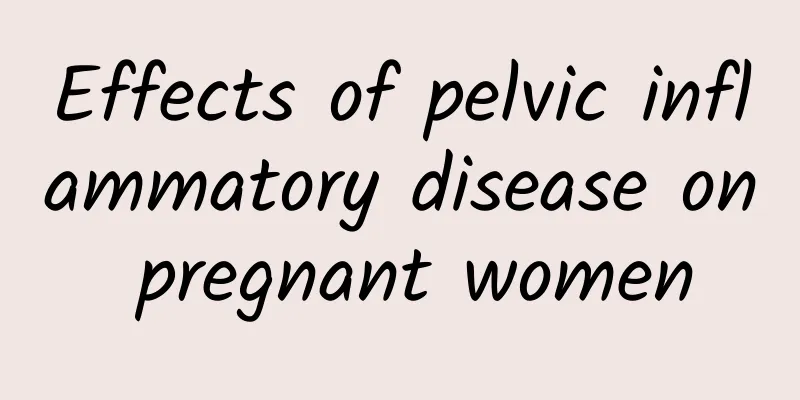Gynecological diseases hidden behind dysmenorrhea

|
Is dysmenorrhea harmful? Will it cause other diseases if dysmenorrhea is not treated in time? "Dysmenorrhea will go away if you endure it." Many women think that dysmenorrhea is not a disease and often think that it will go away if you endure it. In fact, this idea is very irresponsible. Gynecologists point out that dysmenorrhea may be a warning sign of your health. If the cause is not found and treated in time, it may lead to serious trouble. You should know that dysmenorrhea can still cause other gynecological diseases. The biggest harm of dysmenorrhea is that it can cause endometriosis and uterine fibroids. Endometriosis: Many reproductive organ diseases can cause secondary dysmenorrhea, among which endometriosis is the main culprit. The main manifestation is progressive dysmenorrhea. The pain is mostly located in the lower abdomen and lumbosacral region, and can radiate to the vagina, perineum, anus or thigh. It often starts 1 to 2 days before menstruation, is most severe on the first day of menstruation, and gradually subsides after menstruation. Therefore, those with longer menstrual periods often have longer pain durations, which is most prominent in patients with endometriosis. Endometriosis is usually treated with a combination of Chinese and Western medicine. Chinese medicine mainly treats dysmenorrhea caused by blood stasis, and relies on the method of removing blood stasis and dispersing nodules. According to the changes in the patient's menstrual cycle, the right medicine is given to relieve the pain of dysmenorrhea, which can achieve better results. Western medicine mainly performs surgical treatment for patients with severe endometriosis or infertility. Radiofrequency ablation is a relatively advanced minimally invasive treatment method that can not only detect early diseases, but also diagnose and treat at the same time without the pain of abdominal surgery. Uterine fibroids: Uterine fibroids are uterine tumors that grow into the uterine cavity. Because the surface of the fibroids is covered with the endometrium and they occupy space in the uterine cavity, affecting the discharge of menstrual blood, they can cause abnormal uterine contractions, dysmenorrhea, heavy menstruation and irregular periods. The adjacent organs will experience compression symptoms. When the fibroids degenerate or the pedicles of subserosal fibroids twist, severe abdominal pain may occur. The above is an introduction to the harm of dysmenorrhea, and I hope everyone can pay attention to it. Experts remind that if you have any disease, it is a very wrong approach to delay treatment. The best way is to go to the hospital for examination and treatment to prevent the disease from worsening. Dysmenorrheahttp://www..com.cn/fuke/tongjing/ |
<<: Common causes of dysmenorrhea
>>: Are there obvious symptoms of cervical hypertrophy?
Recommend
Can excessive soy milk cause infertility? Doctor: Moderate intake has many benefits
Foreign media reported that animal experiments on...
Are multiple uterine fibroids benign tumors? What is the treatment for multiple uterine fibroids?
Generally speaking, medicine develops rapidly, an...
What are the reactions after taking miso? Take it with mifepristone tablets
If a woman needs medical abortion, in addition to...
After the Mid-Autumn Festival, I have gastroenteritis and vomiting and diarrhea. Can I only eat porridge? ! Nutritionist Gao Minmin: 6 key points of diet for gastroenteritis
The Mid-Autumn Festival is coming soon. When ever...
Want to eat snacks but afraid of getting fat? DIY crispy cereal made with protein powder and oats! Sprinkle with nuts for a refreshing and delicious taste
The crunchy cereal made with protein powder and o...
Can cervical erosion be seen? Is it contagious?
Cervical erosion cannot be seen directly with the...
What are the abnormal symptoms after uterine fibroid surgery?
Uterine fibroids are the most common gynecologica...
Are the systemic symptoms of pelvic effusion obvious?
Pelvic effusion can be divided into physiological...
How to check which bacteria causes chronic cervicitis
The specific pathogens of chronic cervicitis need...
What is the reason for irregular menstruation?
What's wrong with frequent menstrual irregula...
Treatment of pelvic inflammatory disease of damp-heat and stasis type
Traditional Chinese medicine can classify pelvic ...
It usually takes a few days for the bleeding to stop in a spontaneous abortion
Generally speaking, vaginal bleeding after a misc...
Say no to office belly! 6 tips for office workers to stay in good shape
Sitting in the office all day, reduced metabolism...
Cervical erosion is often made into a big deal
Cervical erosion is a common gynecological diseas...
What are the dangers of heavy menstrual flow and blood clots?
Heavy menstrual flow with blood clots is an issue...









